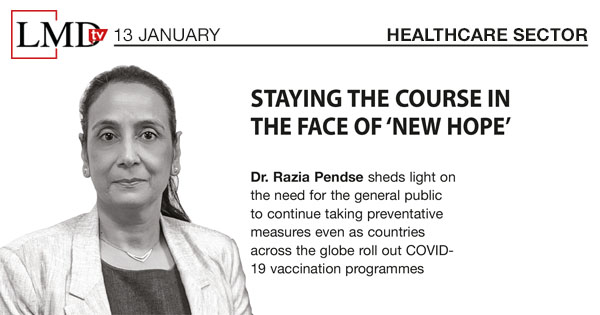
“We are at a critical juncture in the pandemic response for COVID-19; and while the vaccine offers hope, we need to remember that all measures must be taken together,” said Dr. Razia Pendse – the WHO’s Representative to Sri Lanka – as she explained that vaccinations are not a replacement for the precautions taken so far.
She asserted: “We have to stay the course, do it all and do it better if we want to end the acute phase of the pandemic in 2021.”
Elaborating on this, Pendse stressed the importance of populations across the world continuing to practise good hand hygiene and respiratory etiquette, maintain physical distance, wear masks and avoid crowds.
Commenting on the new COVID-19 variant in the UK, which has been reported in other parts of the world as well, she stated that research is ongoing to gain a better understanding of it: “What we have learnt is that while it is transmitted easily, there are no reports of increased pathogenicity or the severity of the disease.”
Moreover, she pointed out that the WHO SARS-CoV-2 Virus Evolution Working Group is working with researchers across many countries to monitor different variations of the coronavirus with little impact being observed on transmission, the severity of the disease and mortality. “While scientists monitor and research the changes in the virus, the public at large needs to take all measures to prevent the spread to others – this will help us break the chains of transmission and spread of COVID-19,” Pendse emphasised.
As for ensuring the equitable distribution of vaccines, the COVAX initiative led by GAVI, the Coalition for Epidemic Preparedness Innovations (CEPI) and WHO looks to ensure access to all vulnerable populations across the globe.
She noted that countries will need to establish vaccination programmes to help achieve the scheme’s aim of rolling out two billion doses by the end of the year. Pendse maintained: “This is critical to end the acute phase of the pandemic, and get back to our lives and livelihoods that have been severely disrupted.”
Among the factors impacting access to vaccines for countries such as Sri Lanka through the COVAX facility is the availability of efficacious and safe vaccines that have passed through stringent testing by regulatory authorities or listed for emergency use by the WHO.
According to Pendse, approved vaccines will be picked up by the facility and it is expected that by the end of the first quarter of the year, vaccines will be distributed to countries that have signed up.
With reports of developed nations ordering and stockpiling sufficient doses to vaccinate their populations multiple times, she stressed the importance of facilitating vulnerable peoples’ access, stating that “viruses don’t respect boundaries and we have seen that with COVID-19.”
“If all people in some countries get the vaccine, we will not be able to turn the tide of the pandemic,” she warned, adding that “global solidarity and equitable access will help us end this pandemic.”
In response to whether hopes that this year will be similar to 2019 rather than last year are well founded, Pendse explained that while vaccines serve as an important tool in combatting the pandemic, another aspect is that “we have to stay the course.”
Emphasising that the behaviour of individuals is also important, she declared: “If we pose as barriers to the virus moving from one person to another, this is also a potential weapon that we could have in breaking the chains of transmission while vaccinations will accelerate this process and curb the spread.”
“There is renewed hope but let’s not forget that we are still amidst the pandemic with many countries seeing surges in cases,” she cautioned.
In her concluding remarks, Pendse reiterated that “if we can continue on this track and do all that is needed to prevent transmission, we should be ending 2021 on a high note.”



